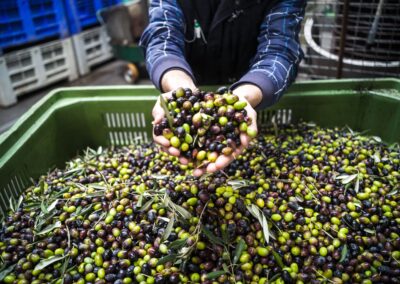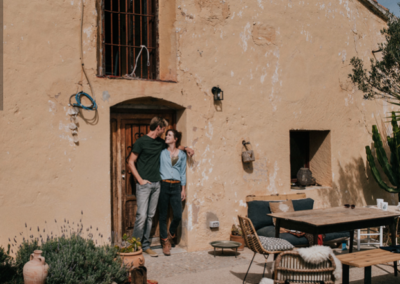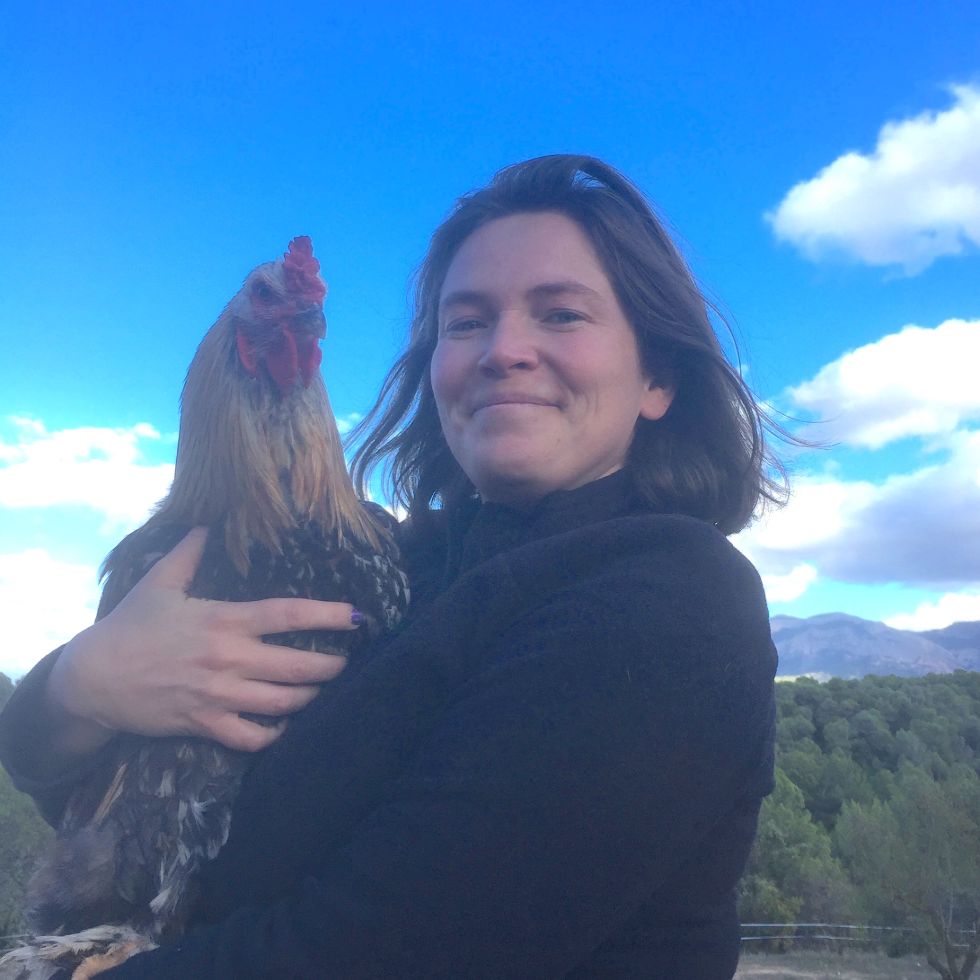Hosting volunteers for work exchange is a lot of fun – and can be very productive as well. It’s the perfect way to tackle a big project, meet different people from other cultures, get some help in your daily life… or all of the above.
To be clear, we’re talking about the kind of work exchange where you as a host offer (usually free) lodging and food, and your future helper agrees to come and work with you while they’re staying at your place.
If you’re reading this, you probably went to all the first steps already. You registered as host on one of the volunteering platforms, chose the perfect volunteer(s) from the myriad of willing workers, agreed with them on the deal – and now they’ll be arriving at your farm, homestead or permaculture project (or maybe just your home!) very soon.
Now here are just a few things to keep in mind as your first volunteers are about to arrive… they will make the whole process so much easier.
1. Know Your Boundaries
One thing we didn’t realise before we started hosting volunteers, was that not everybody comes from the same culture or a similar upbringing; what seems logical for one person, is totally alien for the other.
And everyone has boundaries… even if you’re a pretty easy going person, you must have some kind of boundaries.
This could be physical boundaries; those could be obvious – maybe you don’t want people to come into your bedroom without knocking, or you’d prefer volunteers not to help themselves to the contents of your fridge and pantry without your permission. For many helpers, this will go without speaking – you might need to tell others what they can and cannot do in your house though.
For instance, I’ve discovered I don’t like people to make themselves at home in my kitchen. I cook and bake a lot, and the kitchen is my area; I know where everything is, I know how much butter is left for tomorrow’s cake, and when I leave it spotless in the morning after breakfast, I expect it to still be spotless when I come back to cook lunch.
People taking things from my fridge, using my cooker to make a snack or putting things back in the wrong place mess up my system.
This wasn’t something I realised until after at least a year of hosting volunteers – I would allow them to use the kitchen whenever they wanted, but get VERY annoyed, secretly. Until I thought about it long and hard… and discovered I considered all of these actions an invasion. Things went much better after that 🙂
You probably have certain limits of what you’re willing to do with / for the volunteers you’re hosting. Do you want to share all your meals with them, or will you have lunch together and provide them with food to prepare for the other meals? And if you’re providing food for them, will you only provide meals, or will you also buy them snacks and alcohol if they eat or drink that? If they’re coming without a car and you’re in the middle of nowhere, will you drive them to town when they want to go there – and if yes, how often?
When we just started hosting, we thought we had to provide for all of their food. So we’d take them to the supermarket and let them have whatever they wanted. Most were very reasonable, aiming for the same kind of lifestyle as we were (healthy, fresh and seasonal food, cooking from scratch); some of them would arrive there and stock up on all the “wrong” things – bottles of soda, cakes and chips and cookies, very out-of-season (and thus expensive) fruit and vegetables, and alcohol… We didn’t say anything, but we weren’t happy.
It’s fairly difficult to prepare for every possible situation you might encounter with hosting volunteers. However, knowing what you are or aren’t prepared to do for them can help you set down certain basic rules.
2. Make Up The Rules
The idea of having “rules” sounds harsh… but those rules are actually very beneficial for both parties.
When volunteers arrive at a new place, they have no idea what to expect. Even when they’ve already volunteered at other places, every new place works differently; it’s difficult for them to know what they can or cannot do – and some things they take for granted, might be very offensive to some hosts (and not for others).
Going back to our examples above;
Most volunteers so far were very respectful of the fact they came into our home – they would knock before barging in, ask permission before looting the fridge and not expect to get a personal driver every time they fancied a visit to town. But every now and then, there would be somebody who had no idea. Telling them what we expect helps them behave accordingly – if anything, it’s a lesson that not all cultures take the same things for granted.
In case you’d want some examples, here are our rules – I’m not saying you need to adopt those same rules (you might have totally different boundaries, or a very different setup), but maybe they can help as a guideline.
First Rule For The Volunteers We Host – About Privacy
Just as we will knock when we need to go into their bedrooms or announce ourselves if we’re approaching them outside (I hate to be sneaked upon – so I don’t sneak up on people), we expect people to let us know if they’re coming into our private area. They might need to borrow something or ask us something which is fine – knocking is required though, as that gives us the time to slam shut that bathroom door (or other things).
This is where we tell people about the kitchen as well – it’s my domain, so please ask if you’d like to get something.
Second Rule For The Volunteers We Host – About Food
We don’t have conventional breakfast at standard times, so we will provide our volunteers with their own foodstuffs for breakfast. Our volunteers have their own space to cook, eat and relax.
After work, we’ll have lunch all together (I usually cook it – although sometimes one of our helpers will volunteer); help with clearing up after and washing up the pots is much appreciated.
As lunch is the main meal of the day and we usually have a big lunch, we don’t often have a real dinner. We’ll have a piece of fruit, some salad, leftovers or home made soup; if we’re preparing food, our volunteers are welcome to join us – it’s never a full meal though. If helpers require another full meal at night, they can prepare it for themselves.
We go to a local shop every few days, and our volunteers can either join us, or we’ll bring back food for them. We’ll pay for the regular food (so they have three meals a day, and some fruit in between if they like) – snacks, juices / soda and alcohol is on their own account.
We ask our helpers to keep an eye on their own stock; if they tell us they don’t need anything when we go to the shop, but turn out to be out of milk the morning after… that’s too bad.
Third Rule For The Volunteers We Host – About Working Times
With every new volunteer, we start out with set working times. In winter, they’ll work between 9h and 14h, with a 30 minutes break for almuerzo (second breakfast); in summer, we usually start earlier to stop before it gets too hot. It gives us the chance to work together with them, assess their skills and their willingness to work; once we’ve got a good idea about that, we can always change things. Long term volunteers often have no set hours; they can start work whenever they’re ready for it, and if they work less hours one day, they’ll work more the next.
Our volunteers will have one day off for every 3-4 days worked (depending on the amount of hours worked). Days off are usually on weekdays, as that allows us to do something useful while we’re not working with them – like have meetings and appointments or go to the city for shopping (most shops are closed on Saturday afternoons and Sundays). It’s also in their own benefit – on weekends, restaurants are often more expensive, hiking trails less deserted and local villages less crowded.
Fourth Rule For The Volunteers We Host – About The Dogs
We have a bed & breakfast, so we need our dogs to be well-behaved and friendly. No wild games and playful biting (they could try that with a toddler as well!), no begging or getting food while we’re eating, no lying on the couch, no jumping up. If our volunteers would allow it, how would our dogs know they’re not allowed to do it with paid guests?
Also, we ask our volunteers not to take our dogs on a walk without telling us (and not to take our big dog on a walk at all). There are several reasons for this, one being that many people are terrified of our big dog, and we wouldn’t want problems to occur when others are taking him on a walk.
If you’ve got children, you might want to set rules around them as well. Are they allowed to watch television or play computer games all day long? Can they have candy before dinner?
A sound set of rules makes life so much easier on everybody. We, the hosts, can rest assured people understand what we like and what we prefer them not to do – and volunteers know exactly what’s expected of them.
3. Prepare For The Work
We still make mistakes with this one…
When you’re planning to do a certain job with your volunteers, make sure all the materials and tools are present before they start working. Make sure your tools are in good condition, so you don’t need to start the first working day trying to repair your screwdriver (or discover that it died). You might want to make sure there are some working gloves as well, and maybe protective glasses or anything else you need to create a safe and productive working environment.
4. Upon Arrival… Sit Down And Talk
Then the big day comes… your (first) volunteers are finally there! Maybe they found their way to your place, or maybe you picked them up at the train station or airport and had some time to talk and get to know each other on the way…
When we first get home with our volunteers, we like to offer them a drink. Because the journey probably made them (and us!) thirsty, but also because that gives us the chance to sit down and talk, eye to eye.
We’ll tell them about the rules, and that usually also turns into an interesting conversation about customs and cultures.
We’ll also tell them about us, and what we’re doing here… We’re trying to be as self-sufficient as possible, live on solar power, and have water from our own well. We usually get helpers who love this whole concept, and don’t waste water or use a hair dryer at night (or at all) – but it’s always good to talk about it remind people that life is just a tad bit different here.
We’ll also talk about the work we’ll be doing. We usually did that long before today, in our first e-mail conversation; still, sometimes our helpers agreed on coming here months before – a reminder of the work that lays before them is never a bad thing.
We press unto them that they should ask all the questions they want to ask (better to ask the same question ten times, than to do it wrong once), and that they have to talk to us about anything they’re not comfortable with – whether they find the work too hard or too dangerous, us too rigid or too hard on them, or anything else that might bother them.
We’ll ask them about them as well; what they do in daily life or what they did before they started travelling, what skills they have that could come in handy, and what kind of work they’d like doing (sometimes our helpers want to do a little side project – those are the best!).
5. Always Offer Away Out – And Know You’ve Got One As Well
One tiny detail we should always cover when we’re having that first talk – sometimes it just doesn’t work out.
We’ve had people leaving early because of the weather – sometimes it just rains a LOT in our area, and after 10 days of rain and seeing how lovely the weather is at the coast, who could fault anybody for wanting to leave?
We’ve had people leaving early because the work didn’t suit them. If we’re looking for people to help us build a stone wall, and they turn out to have a bad back and not be able to lift stones all morning, it’s just not a good fit.
We’ve had people leave early because urgent matters required them to go back home. We’ve had people leave early because they didn’t like us. Life happens.
During our first talk, we ask people to tell us if they’re planning to leave. Having volunteers leave early is one thing – having them leave hours after you’ve been shopping for the whole week and while you’re in the middle of preparing a shared meal – and finding out they’ve been planning their “escape” since the day before – that’s not nice. Leaving us high and dry and working against the clock while we had no idea they actually left (or why), that’s just nasty.
We also reserve ourselves the right to ask people to leave. Usually, although we initiate it it feels like a mutual decision; people will have no trouble finding another place to stay – or sometimes we’ll even help them find another host. That it’s not working out with us, doesn’t mean it wouldn’t work out with other people, doing different work.
6. Dp The Tour And Explain What You’re All About
Sometimes our volunteers arrive in the middle of a thunderstorm, or when it’s too hot to go outside… but giving them a tour of the place is too important to forget! Which I sometimes do. Thankfully, they remind me.
We lead them around our house and the bed & breakfast, and tell them about all our future plans with those. We take them on a walk to the vegetable garden and around our land, tell them about permaculture and the way we manage our land – and sometimes they tell us about the experiences they’ve had with those. We’ll tell them about our dreams and aspirations – and they’ll often tell us about theirs.
If they want to know my best recipes or learn how I make bread or bake cakes, I’ll be happy to share it with them. If they’re here to learn about drywall building, carpentry or laying tiles, Axel is a very patient teacher. And sometimes (quite often, actually), they have things to share as well – recipes, herb and plant knowledge, guitar riffs,…
7. Be Clear And Kind
The only real bad experiences we’ve had with volunteers, were due to bad communication.
Often bad communication before arrival – volunteers who didn’t read the manual (as in, the information I send them before they come) – or communication while they’re here… Bad jokes that get taken way too seriously, people who don’t seem to get the rules (when it’s the third time I catch you trying to get the dog to bite you when playing, I’m done asking nicely), or people who don’t speak any of the languages we speak.
And kindness… Do I need to explain this?
We try to get into each and every work exchange with an open mind. Learn about the others, their culture and habits, what they’re doing in life…
We’re sharing our lives with our helpers for a few days, a few weeks or sometimes a few months. It’s a very unique situation – and every single one of them leaves a stamp. Most of them will always welcome back – to work with us again if they’d really want to, but mostly as “real” guests and our friends.
8. Evaluate Things
When volunteers are staying for longer than a week, we like to take some time every week to evaluate how things are going. This can be pretty informal – we’ll usually sit them down around (before, after or during) lunch, and ask them about everything – the workload, their accommodation, the food, time off,…
Happy volunteers make good work.
So… Are you now all ready to host your first volunteers?
Are they arriving soon (or have they already arrived)?
Do you have any questions left, or anything you’re nervous about?








0 Comments